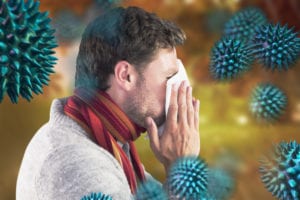Written by Angeline A. De Leon, Staff Writer. Elderberry supplementation prior to, during, and up to 5 days following overseas travel significantly reduced cold duration and symptom severity in participating subjects compared to control.
 Black elderberry (Sambucus nigra L.) is a small, shrubby tree commonly found in areas of Europe. For centuries, elderberries have been used as a traditional treatment for common cold and flu symptoms and other respiratory issues 1. Containing various vitamins (A, B vitamins, C and E), minerals (K, Ca, Mg), and trace elements (Cu, Zn, Fe) 2, this fruit is purported to boast powerful antibacterial 3, antiviral 4, anti-diabetic 5, anti-inflammatory, and immune-modulating 6 properties. In vitro studies have shown that elderberry extract is effective in reducing symptoms, severity, and duration of the flu 7. However, the benefits of elderberry supplementation have yet to be studied in air-travelers in whom respiratory symptoms as well as high levels of stress and physical strain (due to fatigue and impaired immune system function) are particularly common. A recent study conducted by researchers at Griffith University in Australia (2016) sought to understand the potential immune-boosting effects of elderberry in travelers by examining the impact of elderberry extract on respiratory symptoms, as well as overall physical and mental health, in air passengers.
Black elderberry (Sambucus nigra L.) is a small, shrubby tree commonly found in areas of Europe. For centuries, elderberries have been used as a traditional treatment for common cold and flu symptoms and other respiratory issues 1. Containing various vitamins (A, B vitamins, C and E), minerals (K, Ca, Mg), and trace elements (Cu, Zn, Fe) 2, this fruit is purported to boast powerful antibacterial 3, antiviral 4, anti-diabetic 5, anti-inflammatory, and immune-modulating 6 properties. In vitro studies have shown that elderberry extract is effective in reducing symptoms, severity, and duration of the flu 7. However, the benefits of elderberry supplementation have yet to be studied in air-travelers in whom respiratory symptoms as well as high levels of stress and physical strain (due to fatigue and impaired immune system function) are particularly common. A recent study conducted by researchers at Griffith University in Australia (2016) sought to understand the potential immune-boosting effects of elderberry in travelers by examining the impact of elderberry extract on respiratory symptoms, as well as overall physical and mental health, in air passengers.
The randomized, double-blind, placebo-controlled trial involved a total of 312 economy class passengers (aged at least 18 years and in good general health) travelling from Australia to an overseas destination on a flight of at least seven hours. At baseline (ten days prior to travel), before travel (two days prior to travel), and after travel (four to five days following travel), participants were instructed to complete the Perceived Stress Scale (PSS) and assessments of general well-being (SF-12 acute) and quality of life related to respiratory symptoms (Wisconsin Upper Respiratory Symptom Survey, WURSS-21). Cold diagnosis was based on the Jackson Score and cold symptoms were recorded in a daily diary. Travelers were assigned to ingest either standardized elderberry extract or matching placebo (600 mg starting 10 days prior to travel and then 900 mg during travel and continuing an additional four or five days following travel).
Analysis of the Jackson Score indicated that of 312 participants, 29 (about 9%) suffered from a well-defined cold (17 from placebo, 12 from elderberry group). Findings also showed that placebo, relative to the elderberry group, experienced a significantly longer duration of cold episode days (117 vs. 57, p = 0.02) as well as significantly higher symptom scores on average (583 vs. 247, p = 0.05). No significant between-group differences were detected for other indices of interest in the study.
Data suggest that for a participant suffering from a cold episode, supplementation with elderberry is associated with about a 2-day reduction in cold duration and significantly lower overall symptom severity. Although the clinical benefits of elderberry extract for air travelers are evident based on findings, further research is needed to establish the herb’s impact on stress levels and mental well-being, as well as specific symptoms of respiratory infection in passengers. Given that half of sick participants in the present study opted to use co-medication to relieve symptoms, it would also be important for future work to isolate the clinical effects specific to elderberry extract.
Source: Tiralongo E, Wee SS, Lea RA. Elderberry supplementation reduces cold duration and symptoms in air-travelers: A randomized, double-blind placebo-controlled clinical trial. Nutrients. 2016; 8: 182. DOI: 10.3390/nu8040182.
© 2016 by the authors; licensee MDPI, Basel, Switzerland. Creative Commons by Attribution (CC-BY) license (http://creativecommons.org/licenses/by/4.0/)
Click here to read the full text study.
Posted January 16, 2018.
References:
- Roxas M, Jurenka J. Colds and influenza: a review of diagnosis and conventional, botanical, and nutritional considerations. Alternative Medicine Review. 2007;12(1):25-49.
- Mikulic‐Petkovsek M, Ivancic A, Todorovic B, Veberic R, Stampar F. Fruit phenolic composition of different elderberry species and hybrids. Journal of food science. 2015;80(10).
- Krawitz C, Mraheil MA, Stein M, et al. Inhibitory activity of a standardized elderberry liquid extract against clinically-relevant human respiratory bacterial pathogens and influenza A and B viruses. BMC complementary and alternative medicine. 2011;11(1):16.
- Roschek B, Fink RC, McMichael MD, Li D, Alberte RS. Elderberry flavonoids bind to and prevent H1N1 infection in vitro. Phytochemistry. 2009;70(10):1255-1261.
- Gray AM, Abdel-Wahab YH, Flatt PR. The traditional plant treatment, Sambucus nigra (elder), exhibits insulin-like and insulin-releasing actions in vitro. The Journal of nutrition. 2000;130(1):15-20.
- Badescu M, Badulescu O, Badescu L, Ciocoiu M. Effects of Sambucus nigra and Aronia melanocarpa extracts on immune system disorders within diabetes mellitus. Pharmaceutical biology. 2015;53(4):533-539.
- Kong F-k. Pilot clinical study on a proprietary elderberry extract: efficacy in addressing influenza symptoms. Online Journal of Pharmacology and Pharmacokinetics. 2009;5:32-43.

